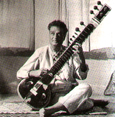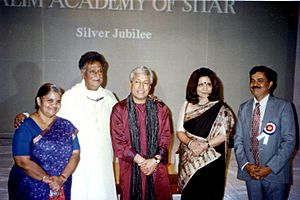Abdul Halim Jaffer Khan facts for kids
Quick facts for kids
Abdul Halim Jaffer Khan
|
|
|---|---|
 |
|
| Background information | |
| Born | 18 February 1927 Jaora, Madhya Pradesh, India |
| Died | (aged 89) Mumbai, India |
| Genres | Hindustani classical music |
| Occupation(s) | Sitarist, Composer, Innovator, Author |
| Instruments | sitar |
| Labels | Various |
| Associated acts | Nikhil Banerjee, Ravi Shankar, Vilayat Khan, Julian Bream, Dave Brubeck, Zunain Khan |
Abdul Halim Jaffer Khan (born February 18, 1927 – died January 4, 2017) was a very famous Indian sitar player. The sitar is a stringed instrument used in classical Indian music. He was known for his unique playing style.
Khan received important national awards for his music. These included the Padma Shri in 1970 and the Padma Bhushan in 2006. He also won the Sangeet Natak Akademi Award in 1987.
Contents
Early Life and Musical Journey
Abdul Halim was born in 1927 in a place called Jaora, in India. His father, Jaffer Khan, was also a talented musician. He played many instruments and sang. Abdul Halim learned music from his father.
His family belonged to the Beenkar Gharana of Indore. A "Gharana" is like a special school or style of music that is passed down through families. He started performing on All India Radio in the early 1940s. This was a big achievement for a young musician.
Playing with International Artists
Abdul Halim Jaffer Khan also played with famous musicians from other countries. In 1958, he met and played with Dave Brubeck. Brubeck was a well-known jazz pianist from the United States. He was very impressed by Indian music. Brubeck said that playing with Khan changed how he played music.
In 1963, Khan also performed with Julian Bream. Bream was a famous classical guitarist from England. These performances showed how music can connect people from different cultures.
His Unique Sitar Style
Khan was famous for his own special sitar style called Jafferkhani Baaj. He described it as a mix of very precise playing and clear thinking. He also played with a lot of energy.
A professor named Dr. Kamala Ganesh said that Khan was a "thinking musician." This means he thought deeply about his music. He could share his complex ideas in a simple and heartfelt way.
A Memorable Performance
Another famous Indian musician, Shivkumar Sharma, remembered one of Khan's performances. It was around 1955. Sharma was relaxing when he heard the sitar playing from his neighbor's radio. He immediately noticed that the sound and style were very different and unique. He rushed to turn on his own radio and was completely amazed by Khan's music.
Bringing New Ragas to Sitar
Khan helped bring many new ragas to the sitar. Ragas are like musical scales or melodies in Indian classical music. He took ragas from Carnatic music (another style of Indian classical music) and played them on the sitar in his own Jafferkhani style.
He was also the first Hindustani musician to perform with a Carnatic musician. He played with the famous Veena player Emani Sankara Sastry. This was a big step in bringing different styles of Indian music together.
Music for Indian Films
Abdul Halim Jaffer Khan also worked in Indian cinema. In 1946, when he was just 17, he played the sitar for the film Parwana.
He also composed music and played for many other famous films. These included Mughal-e-Azam, Jhanak Jhanak Payal Baaje (1971), Goonj Uthi Shehnai (1959), and Kohinoor (1960). He worked with well-known music directors like Vasant Desai and Naushad. Naushad once said that Khan's music not only made film songs better but also gave them more respect.
In 1976, Abdul Halim Jaffer Khan started his own music school. It was called the Halim Academy of Sitar in Mumbai, India.
Later Years and Legacy
Abdul Halim Jaffer Khan passed away on January 4, 2017. He was 89 years old and died at his home in Mumbai, India.
His music and unique style continue to inspire many musicians. He left behind a rich legacy in Indian classical music and film.
Awards and Recognition
Abdul Halim Jaffer Khan received many important awards for his contributions to music:
- Tagore Fellow of Sangeet Natak Akademi in 2012
- Padma Bhushan (Government of India) in 2006
- Lifetime Achievement Award (Legends of India) in 2005
- Haafiz Ali Khan Award in 1992
- Shikhar Samman (Government of Madhya Pradesh) in 1991
- Gaurav Puraskar (Government of Maharashtra) in 1990
- Sangeet Natak Akademi Award in 1987
- Padma Shri (Government of India) in 1970
Film Features
A film called Raga featured a young Abdul Halim Jaffer Khan. The film was narrated by the famous violinist Yehudi Menuhin. In the film, Khan played the raga Sindh Bhairavi.
Images for kids
 | Janet Taylor Pickett |
 | Synthia Saint James |
 | Howardena Pindell |
 | Faith Ringgold |


